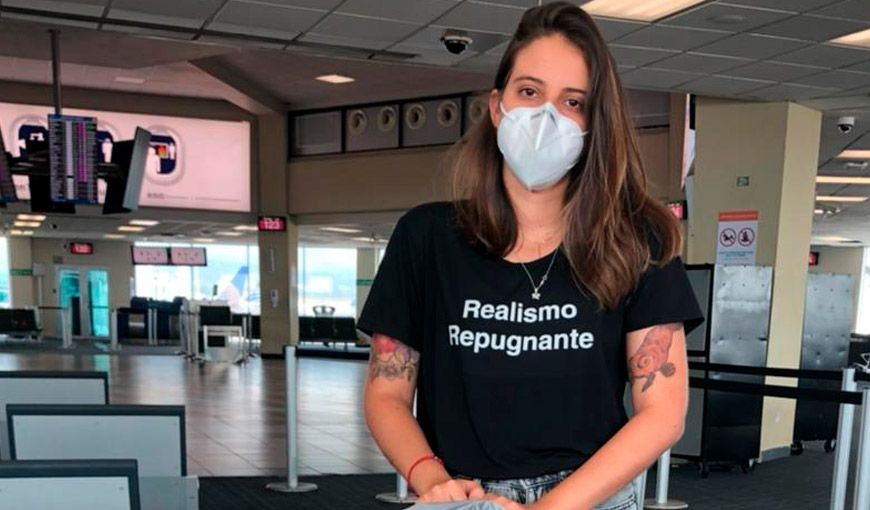
Karla Pérez en el aeropuerto internacional de Tocumen. Ciudad de Panamá, 18 de marzo de 2021. Foto: El Mundo CR.
Karla Perez’s Forced Exile from Cuba
29 / marzo / 2021
The Cuban government has arbitrarily deprived Karla Perez, 22, of her rights on more than one occasion. Firstly, when it violated her right to study because for political reasons. Now, they have left her in a “stateless” situation by preventing her from entering Cuba. They only notified her of the ban on entry when she was already in transit in Panama on her way home. Karla Perez is a victim who has not only suffered damages, but has also been denied any potential reparations.
I’m not talking about Karla like a victim because I want to exaggerate her case. I’m doing it because a victim is someone whose rights have been violated and, as a result, has suffered unjustified damages.
The damage suffered by Karla, and a countless number of Cubans banished over the decades, wasn’t inflicted by a crazy or confused official. In a centralized system like Cuba’s, where there is a hierarchy, and very little room for officials to act independently, actions like this aren’t coincidental. The Cuban government hold the utmost and direct responsibility.
The separation of functions between institutions isn’t the same here in Cuba like it is in democratic countries. It isn’t the same in any procedure and responsibility that is classified as “national security”, which leaves little or no room for subordinate public servants to improvise and act on their own initiative. The obvious immunity that the Ministry of Interior and its State Security and Immigration agents will enjoy in the wake of violating Karla’s rights, as well as the support the decision-makers have received from officials at the Ministry of Foreign Relations (MINREX), is the Government explicitly supporting this kind of behavior, without there being any consequences.
The press conference given by Yaira Jimenez, the Public Relations director at MINREX, on March 19th, justified Karla’s exile. She alleged that it had to do with a “Cuban citizen and emigre who has spent many years abroad, with connections known with her mentor Eliecer Avila, and other figures.”
Jimenez also said that Karla is an “instrument and it isn’t the first time that she is being used for these kinds of schemes and unlawful and destabilizing actions against Cuba.” She finished by saying that the “intention to reinsert Karla in the country served subversive purposes.”
Important conclusions can be deduced from the MINREX official’s statement:
1- The Government does not recognize that citizenship is the basis for recognizing Cuban citizen’s right. Cubans who emigrate can be treated differently, especially if they have been outside the country for several years, in spite of their theoretical equality with citizens living on the island.
2- According to the Cuban government, a person cannot only be assessed and judged by their actions, but also by their relationships.
3- A citizen of Cuba trying to enter the country can be considered a “scheme”, an “illegal action” and even an “attempt to destabilize Cuba” -even if they abide by the Law.
4- Just the intention or an alleged intention to subvert order is punishable in the Cuban government’s eyes, even if this intention hasn’t materialized in the slightest. According to MINREX’s statement, Karla has been exiled not for a crime, but for thinking of committing a crime.
OLD-FASHIONED EXILE IS ALIVE AND KICKING IN CUBA
In Ancient Greece, exile – called ostracism, which is where we get the word for forced isolation from today – was a punishment for enemies of the polis. This was especially abused in times of crisis in ancient democracy. In medieval law, exile was considered an alternative punishment to the most severe of them all: death. If it wasn’t respected, it meant death.
The international community has, to a large extent, overcome the application of ancient justice and the conception of medieval law. Today, some of the most important international instruments of human rights recognize the right of any national to return to their own country, thereby outlawing exile as a punishment.
The International Covenant on Civil and Political Rights states in Article 12 that “No one shall be arbitrarily deprived of the right to enter his own country”; and the American Convention on Human Rights establishes in Article 22 that “No one can be expelled from the territory of the state of which he is a national or be deprived of the right to enter it.”
So, exile in Cuba is also the consequence of a lack of control of the Government’s decision. Discretion which when absent becomes arbitrariness, all too often.
Many people say that Karla’s exile is legal. They say that Law 1312 allows the Cuban government to prevent the entry of anyone in national territory when they commit one of the causes outlined in Article 24.
Article 24.1. Law 1312.
That law allows the Cuban government to deny the entry of anyone who organizes, encourages, executes or participates in hostile actions against the Cuban State’s political, economic and social foundations. It also allows the government to deny the entry of any person when the Minister of Defense and National Security so advises.
An analysis that only focuses on Law 1312 and what it stipulates, is an analysis that misses two key points. The law needs to serve an ideal of justice or should lean to finding this, at the very least. There is no justice, or a will to seek justice, in a law that legitimizes the violation of human rights. There is no justice in a law that only serves to further entrench the absolute power of a State, with no regard for the suffering of its citizens along the way. In the face of an unjust Law, peaceful civil disobedience can arise as a valid citizen-led political act.
This same analysis that tries to focus on Law 1312 forgets that the Constitution pushed by the Communist Party and approved in 2019, recognizes that public servants’ discretion is not unrestricted, but regulated. Article 94 e) of the Constitution in force establishes that rights cannot be deprived except by the ruling of a competent authority or final judgement of a court; Karla, and other Cubans, are still waiting for the official notice of their exile.
In the Law, an administrative or legal decision doesn’t exist, nor does it come into effect, until it has been duly notified with a resolution or sentence. Up until today, nor WhatsApp, nor a phone call, nor the radio, or TV, or the written press are valid ways to communicate administrative acts. Silence cannot be a solution – as well as being discussed in-depth from a doctrinal point of view – in this case, as it is a matter of depriving a right that has been recognized by the Constitution and goes against what is stipulated in abovementioned Article 94 e) of the Constitution.
Highlighting the fact that there is no official notification of this decision is no small thing. People have the right to not be deprived of their rights without compulsory regard for or a legitimate cause and process of safeguards, due to our human condition and not because a Government says so. Some of these safeguards come into play because we are heard, because we are allowed to contradict and turn to a second legal instance to revise the decision that affects us. Karla hasn’t been able to – and it seems she won’t be able to – exercise any of her above rights, because the real reason why she is being deprived of them is still unknown.
The Law cannot be interpreted in a segmented way. Legal systems, structured in an efficient way, need to respond and be interpreted with systemic logic. When it is established that the Cuban government holds the power to exile Cuban nationals and, at the same time, nobody questions the way in which this power is being exercised, we run the risk of accepting that the State can pursue its interests however it wants. The way Karla was treated not only implies a violation of the Cuban Constitution. The way Karla was abused hides the denial of her human condition and as a bearer of rights.
This article was translated into English from the original in Spanish.


If you believe that our journalism is important for Cuba and its people, we want you to know that this is a critical moment.
Behind each publication there is a team that strives to ensure that our products meet high quality standards and adhere to professional and ethical values.
However, to keep a close watch over government, demand transparency, investigate, analyze the problems of our society and make visible the hidden issues on the public agenda is an effort that requires resources.
You can contribute to our mission and that is why today we ask for your help. Select the way you prefer to send us a donation.








comments
We moderate comments on this site. If you want to know more details, read our Privacy Policy
Your email address will not be published. Mandatory fields are marked with *